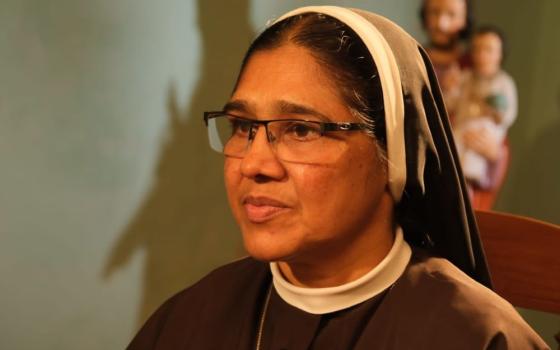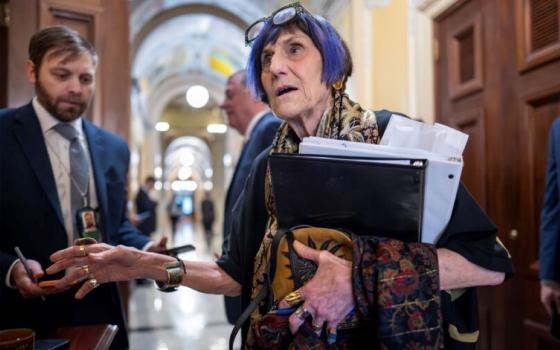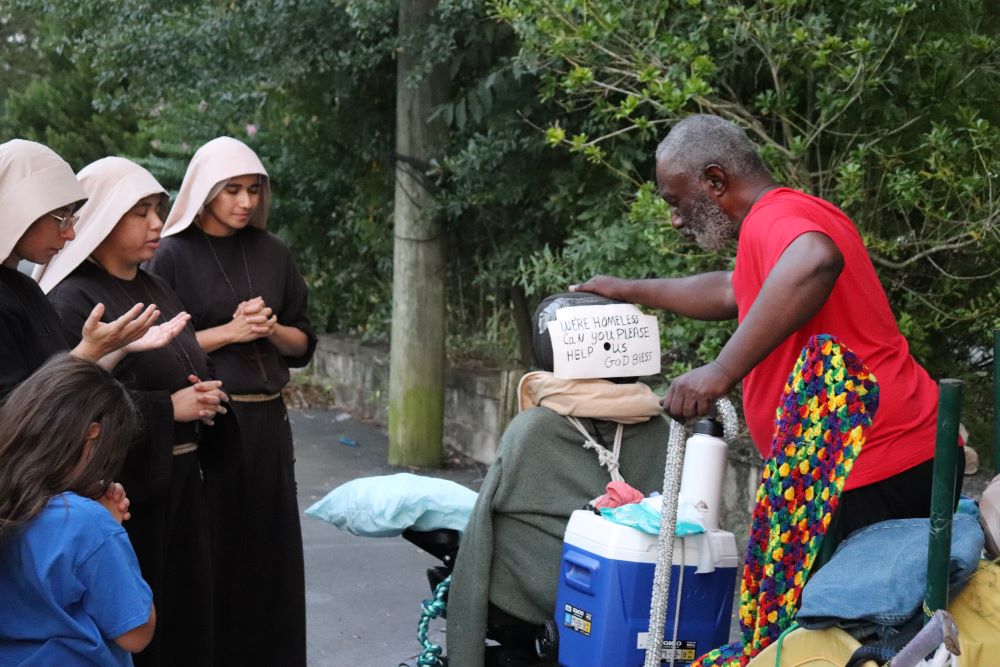
Sisters Poor of Jesus Christ pray with a man during their street ministry in Cedartown, Georgia. The sisters arrived in the community in early 2022, after a request from the pastor of St. Bernadette, the town's only Catholic congregation. (Courtesy of St. Bernadette Church)
In downtown Cedartown, Georgia, the modest original brick structure for St. Bernadette Roman Catholic Church is nestled among the hulking sanctuaries and life centers of its Protestant neighbors.
It's the Bible Belt. As Southerners like to say, "There's a church on every corner."
But St. Bernadette stands out as the only Catholic congregation in town. And it's the only one in a considerable radius housing religious sisters. Members of the Sisters Poor of Jesus Christ, with their traditional, flowing robes, are an unusual sight in this rural, Appalachian setting, but they're inspiring participation among those who witness their evangelism and determination.
The parish pastor, Fr. Timothy Gallagher, calls the sisters' arrival here miraculous. It was a process that began a few years ago when a brother from the Poor of Jesus Christ community in Birmingham, Alabama, visited Cedartown. The community, Gallagher explained, houses brothers and sisters independently of each other, although they're united in charism. Gallagher told the visitor of his desire to have a religious community in his own parish.
'There's missionary work in every place.'
—Sr. Antonella of the Holy Cross
Cedartown's out-of-the way location made the thought unusual — it's separated by a long stretch of state highway from other towns north and south. But Gallagher took a chance and showed the brother around, pointing out all the ministry opportunities, including immigrants who need help getting established and a festering community drug problem.
The church had just added a large, new facility, and its older, smaller building, which includes a rectory, was empty at the time. Gallagher figured his suggestion that the empty building house religious wouldn't amount to anything.
"I just went on my way. He went on his way," Gallagher recalled. "But to my surprise later on — I don't remember how long after that — I was contacted, and they said, 'Yes, we'd like to send some sisters. … Usually, they only go to metropolitan areas, and I'm in a more rural area. I was shocked."
COVID-19 and a change in archbishops brought a two-year delay Gallagher called "frustrating," but the sisters did eventually arrive in early 2022, with full archdiocese support, from communities in Brazil. And Cedartown took note.
"They came to town, and they were really, like, a spectacle, I think, in a good way," Gallagher said. "They would walk around the sidewalks, and there's little festivals that we have in the park. People were just like, 'What in the world is that?' "
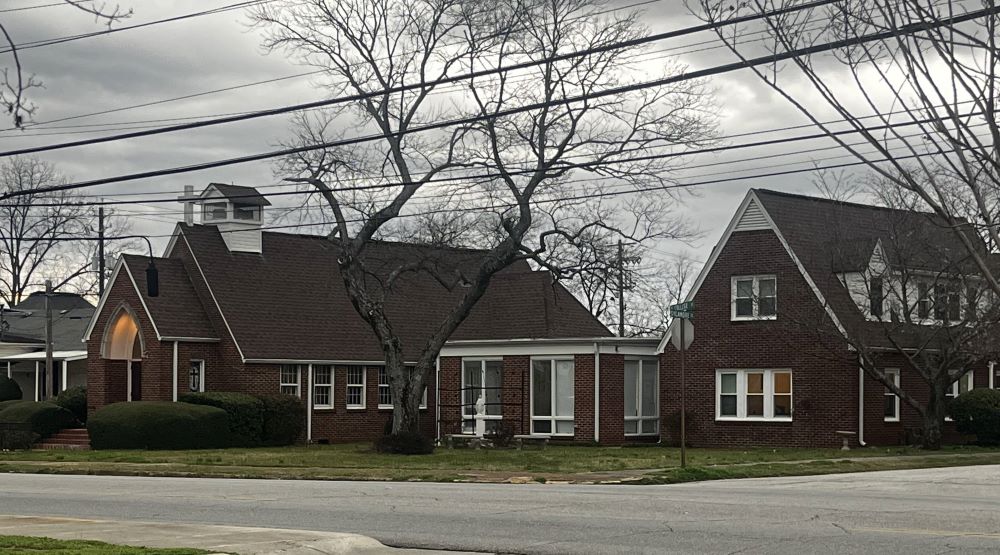
Three members of the Sisters Poor of Jesus Christ live at St. Bernadette Roman Catholic Church in Cedartown, Georgia. Two of the parish's three Sunday Masses are now in Spanish to accommodate an influx of local speakers..(GSR photo/Elizabeth Crumbly)
Since that time, the sisters, initially numbering four but down to three now, have found ways to fulfill their main apostolic work — assisting homeless and those suffering from addiction — in Cedartown and nearby Rome. They go by their religious names, and once a week, Srs. Bernarda of Jesus Supplicant, Antonella of the Holy Cross and Neriáh of the Immaculate Conception can be found at a shopping center in Rome, which lies about 20 miles north of Cedartown. As Northwest Georgia's largest city, it's over three times the size of Cedartown, which has a population of about 10,000. The homeless population in this part of the state tends to be farflung, and the sisters have had an easier time connecting with them in Rome.
"We take our clothes and food and hygiene products, we stop by there, and people come," explained Bernarda. "The first time we went, it was hard because we couldn't find a lot of people around. We had to drive and drive and drive. They started to get to know us."
At this point, the sisters encounter familiar faces most visits. Sometimes, people they've met are missing, and they find out later about a trip to the hospital or jail or a move out of town. The women keep up with locals' stories and welcome them back with assistance and a listening ear if and when they return.
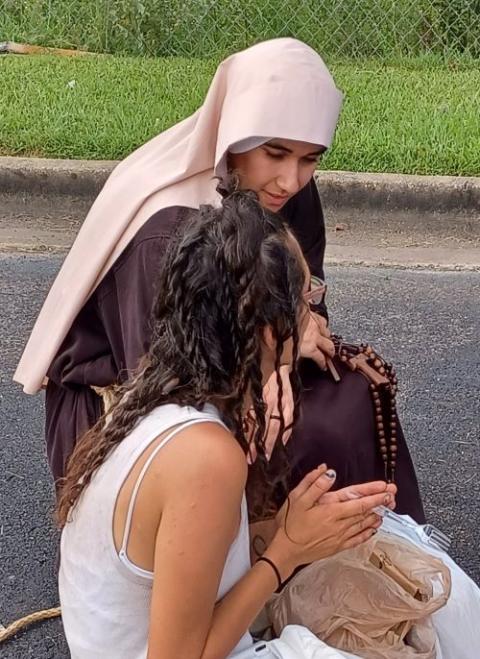
Sr. Neriáh of the Immaculate Conception prays with a community member during their street ministry. (Courtesy of St. Bernadette Church)
"This friendship is not just going and giving them something randomly," Antonella said. "It's being there, always, and asking how they are doing and helping them in what way we can."
Overcoming hurdles
Bernarda is originally from Paraguay; her fellow sisters are from Brazil, where the community was founded. There are 80 houses around the world now, including four in the United States. Bernarda and Antonella are used to communities with multiple parishes and chapels that serve individual neighborhoods. In Northwest Georgia, a single church usually serves each town.
Antonella grew up in a small town, but she served in bustling São Paulo, Brazil, before coming to the United States. She was used to seeing people experiencing homelessness everywhere, she said. Here, there's need, but it's not so obvious — the sisters have had to go in search of it.
"In a small town, it's more spread out, so going out and finding those poor people in need takes more effort and more vulnerability on their part," Gallagher said of the sisters.
And with that geographical distance comes hurdles: One has been transportation.
"Just driving was a big obstacle because none of them had a license," Gallagher said, adding that Bernarda "very energetically and enthusiastically" became their driver.
Safety has also been a significant consideration as the women have expanded their outreach.
"They're young women, so it's a little scary just going out and on your own in a place that is completely foreign," Gallagher said. "That was a challenge for them — just trying to feel that safety. I talked to the chief of police of the town to keep his eyes on the girls when they're out and about."
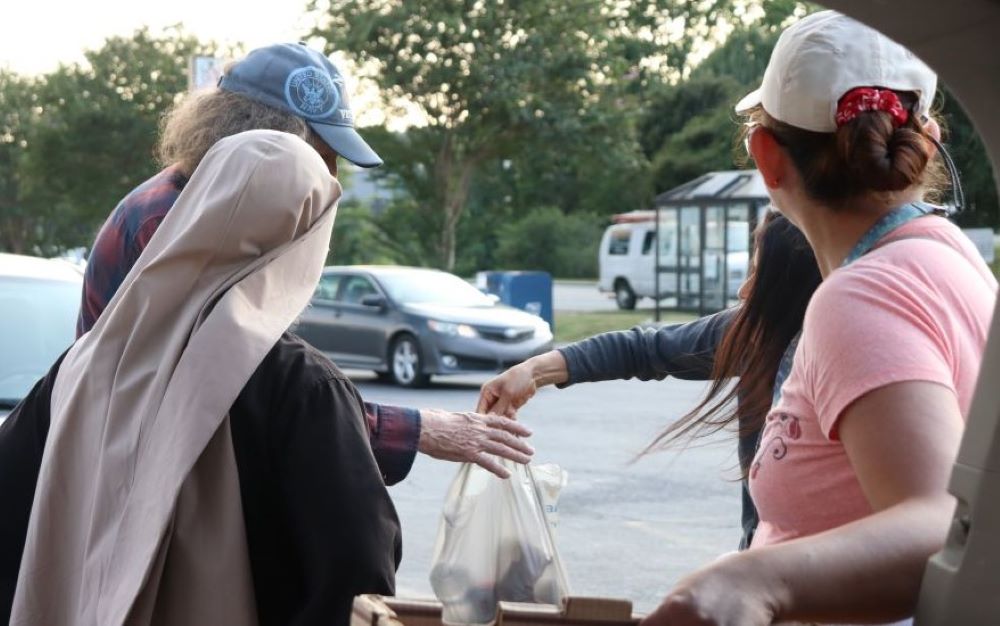
Community members accept food from members of the Sisters Poor of Jesus Christ in Cedartown, Georgia. The sisters have ministered there since early 2022. (Courtesy of St. Bernadette Church)
And there's the issue of sustenance. The Sisters Poor of Jesus Christ are mendicants who depend completely on providence.
"They don't get paid like some religious communities do," Gallagher said. "There are some anxieties there: 'How are we going to make it?' "
A supportive archdiocese and archbishop and generous parishioners helped with expenses as the sisters established themselves, he said.
Two of the sisters came to Cedartown knowing English, but all of them still had to learn how to communicate with people in their new parish. Understanding the Southern drawl, Gallagher said, has been a curveball at times. English classes for each of the women online and through nearby Georgia Northwestern Technical College have helped.
Bernarda also speaks Spanish, and although she said her dialect is different from that of the Central American immigrants she serves in the church, she can at least still communicate with them in a familiar language. The sisters' commitment to learning the language, she said, has made the hurdle look more doable for members of the church's considerable Hispanic population who do not speak English.
It's the language of loving presence, though, that strikes Gallagher the most.
"I think just their presence — just being there, praying with us, walking with us — that is the main language," Gallagher said. "The language of presence, love, service — you see that the actual language barrier is not so much a barrier."
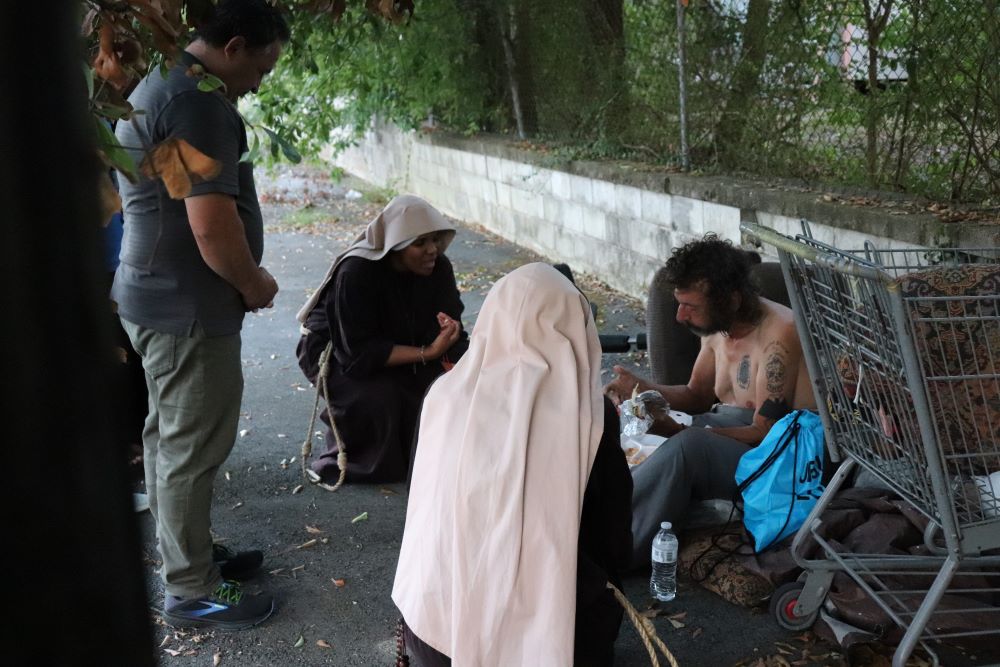
Sisters Poor of Jesus Christ pray with a man during their street ministry in Cedartown, Georgia. Their main apostolic work is assisting people experiencing homelessness and addiction in Cedartown and nearby Rome. (Courtesy of St. Bernadette Church)
A spirit of unity
Two of the church's three Sunday Masses are now in Spanish to accommodate an influx of local speakers, and the church recently put up a much larger building where English- and Spanish-speaking parishioners can worship together, rather than in separate locations as they had been doing for years.
Gallagher likened the merger to a marriage with lots of love and some inevitable challenges as two populations have come together under one roof. The sisters have contributed to unifying the congregation through bilingual activities like spiritual retreats and counseling for different demographics including women, couples and catechists.
Overall, Gallagher said, they've helped the church's "spirit of unity," a theme for this multicultural parish. That unity has helped produce one of the largest congregations in town. Despite the bigger building, the parking lot is becoming a tight squeeze, he said.
The sisters have encountered lots of locals who have never interacted with women religious. At this point, they respond in good humor to people taking pictures of them on the street and making off-the-wall comments.
"They're asking if we're wearing costumes for Halloween, or they're asking, 'What are you doing here in the supermarket?' " Bernarda said. "We say, 'We are religious sisters, and we eat like normal people!' "
Advertisement
But those interactions, she pointed out, have yielded "many beautiful situations," Bystanders, she said, frequently ask how they can help the sisters in their street ministry. They'll buy sodas to pass out to those experiencing homelessness, and they'll leave praying about the situations they've witnessed.
And the relative unusualness of their dress, Gallagher said, has contributed to the sisters' ability to reach people.
"It's where the traditional habit is just such an evangelical tool," he said. "That's why many younger girls are attracted to it. It just feels like it helps them embrace that new identity, that radical way of life."
The sisters realize service in an unexpected place might not initially seem as impactful as work in a bigger city, but Antonella said they've found plenty to do.
"Sometimes people ask, 'Why are you in Cedartown?' It's just a little town — not a lot of people, not a lot to do, but I think they are wrong," she said. "There's missionary work in every place."



